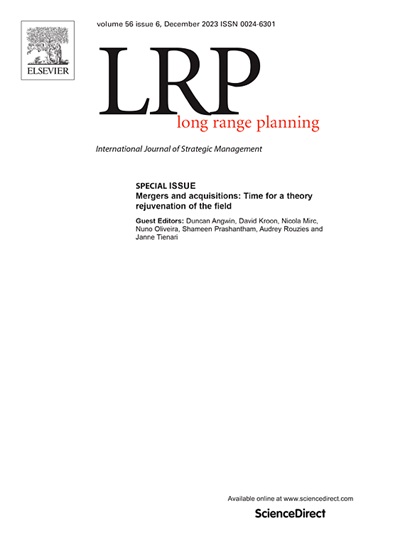企业决策者的环境可持续性盈利信念:测量和后果
IF 6.3
2区 管理学
Q1 BUSINESS
引用次数: 0
摘要
在平衡环境可持续性和盈利能力之间的紧张关系方面,公司面临着一个根本和持久的挑战,其中看似单独合乎逻辑的要素在并列时变得相互矛盾。个体决策者对环境可持续性和盈利能力之间的紧张关系的信念可以影响决策结果,为战略选择提供了一个有趣的微观基础。本文概念化并提出了一个尺度来衡量决策者对环境可持续性和盈利能力之间的紧张关系的信念。在三项研究中,我们开发了一个可靠、有效、简洁的12项环境可持续性-盈利能力信念(ESPB)量表。进一步的三个研究表明,它能够预测可持续新产品创意的评价、不同众筹平台市场的投资成功以及可持续新产品创意的信息搜索努力。总体而言,研究结果强调了个人层面对可持续性和盈利能力的信念对确定战略决策结果的重要影响,增强了对公司可持续性实践的关键微观基础的理解。本文章由计算机程序翻译,如有差异,请以英文原文为准。
Environmental sustainability–profitability beliefs among firm decision makers: Measurement and consequences
Firms face a fundamental and persistent challenge in balancing the tensions between environmental sustainability and profitability, where elements that seem logical individually become contradictory when juxtaposed. Individual decision makers' beliefs about the tensions between environmental sustainability and profitability can shape decision outcomes, offering an intriguing micro-foundation for strategic choices. This article conceptualizes and proposes a scale to measure decision makers' beliefs about the tensions between environmental sustainability and profitability. Across three studies, we develop a reliable, valid, parsimonious 12-item environmental sustainability–profitability beliefs (ESPB) scale. Three further studies demonstrate its ability to predict evaluations of sustainable new product ideas, investment success in markets with different crowdfunding platforms, and information search efforts for sustainable new product ideas. Overall, the findings emphasize the important influence of individual-level beliefs about sustainability and profitability for determining strategic decision outcomes, enhancing the understanding of key micro-foundations of firms’ sustainability practices.
求助全文
通过发布文献求助,成功后即可免费获取论文全文。
去求助
来源期刊

Long Range Planning
Multiple-
CiteScore
13.00
自引率
7.10%
发文量
75
期刊介绍:
Long Range Planning (LRP) is an internationally renowned journal specializing in the field of strategic management. Since its establishment in 1968, the journal has consistently published original research, garnering a strong reputation among academics. LRP actively encourages the submission of articles that involve empirical research and theoretical perspectives, including studies that provide critical assessments and analysis of the current state of knowledge in crucial strategic areas. The primary user base of LRP primarily comprises individuals from academic backgrounds, with the journal playing a dual role within this community. Firstly, it serves as a platform for the dissemination of research findings among academic researchers. Secondly, it serves as a channel for the transmission of ideas that can be effectively utilized in educational settings. The articles published in LRP cater to a diverse audience, including practicing managers and students in professional programs. While some articles may focus on practical applications, others may primarily target academic researchers. LRP adopts an inclusive approach to empirical research, accepting studies that draw on various methodologies such as primary survey data, archival data, case studies, and recognized approaches to data collection.
 求助内容:
求助内容: 应助结果提醒方式:
应助结果提醒方式:


